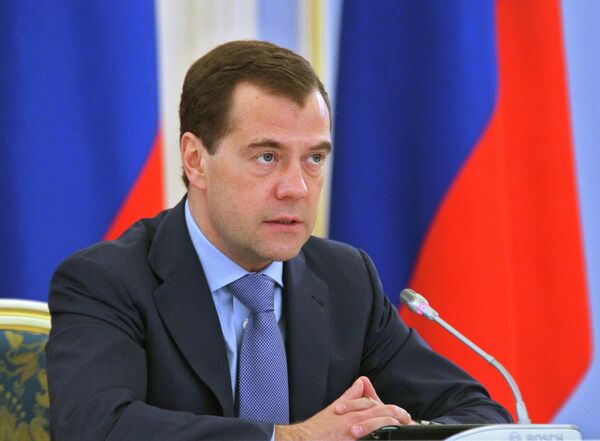The recent sacking rampage by outgoing President Dmitry Medvedev was orchestrated by his successor Vladimir Putin, who is weeding out second-tier elites ahead of his third presidency, analysts said.
“Putin needs to create a semblance of starting from a blank slate,” Pavel Salin of the Center for Political Assessment think-tank said on Friday.
The ruling United Russia party fielded on Friday its nominees for governorship of five Russian regions, including Leningrad, Perm, Stavropol and Yaroslavl, as well as the republic of Buryatia, all of which have lost or are about to lose their leaders.
Most outgoing governors filed voluntary resignation requests, but the practice is widely seen as a face-saving measure in Russian politics where unwanted officials are rarely sacked outright. Medvedev accepted all resignations.
The president, who is formally handing over the Kremlin seat to Putin on Monday, also made reshuffles in the military last week, firing the chief of Russian Air Force, Alexander Zelin, and appointing a new chief of Ground Forces and deputy chief of General Staff.
Various Reasons
There is no direct connection between the removals which targeted various underperforming officials, analysts said. “Each firing has its internal logic,” Salin said.
Most governors who lost their jobs did so because the ruling party and Putin scored poorly at recent parliamentary and presidential elections in their regions, said political analyst Mikhail Vinogradov. The most vivid example is Yaroslavl, where United Russia had its worst showing among all 83 regions, winning 29 percent at the polls in December compared to its national average of 49 percent.
The Kremlin has been appointing governors since 2005, but will revert to popular elections of leaders starting next year. The upcoming reform prompts it to reappoint as many governors in problem regions as possible while there is still time, analysts said.
Medvedev himself has not commented on governors stepping down, but said last week that he unofficially pressured many regional leaders to leave during his time in the Kremlin because they were suspected of corruption. No governors were convicted on corruption charges under Medvedev.
Meanwhile, the reshuffle in the armed forces is apparently connected to rumors about the upcoming departure of Defense Minister Anatoly Serdyukov, said Vinogradov, who heads the St. Petersburg Politics Foundation.
Air Force Commander Zelin was also mired in a corruption scandal last year, when a whistleblowing pilot in the Lipetsk region accused his seniors of taking parts of his colleagues’ salaries and possibly paying kickbacks to the top brass, Moskovsky Komsomolets daily said on Tuesday, adding that the incident contributed to the officer’s removal.
Medvedev as a Proxy
Though overseen by Medvedev, the firings were initiated by Putin, who has carried out similar small-scale purges during his two previous presidencies in 2000-2008, also launching them before his formal ascent to power, said Alexei Mukhin, who heads the Moscow-based Center for Political Information.
Medvedev, a longtime aide of Putin, was endorsed by him during the presidential race of 2008, but agreed last fall not to seek reelection and instead swap jobs with Putin, who is currently prime minister.
Putin could have carried out the sackings himself, but opted to hand over the task to Medvedev because he is still not free from the “tandem” mindset when he split important public decisions with Medvedev, boosting the latter’s political clout, Salin said
Besides, Putin has always been reluctant to accept responsibility for removing officials, a job he traditionally preferred to do through proxies, Salin said.
The non-removal policy was considered by most pundits a staple of Putin’s “power vertical,” a rigid system of country governorship whose members traded loyalty to the Kremlin for stability of their own positions.
Medvedev’s firing spell could cast some doubt on the policy, but not to the extent of robbing Putin of the bureaucracy’s support, analysts said.
“The belief that Putin does not sack his people is a myth. He’s loyal, sure, but he always dealt firmly with those who have failed him,” Mukhin said.
Medvedev himself has replaced more than half of all governors nationwide during his tenure in the Kremlin, uprooting political heavyweights such as Moscow Mayor Yury Luzhkov and Tatarstan’s leader Mintimer Shaimiyev, both of whom stayed in power for almost two decades. Analysts said at the time the decisions were likely lobbied by Medvedev and endorsed by Putin.
Can’t Stop the Purges
Mukhin predicted that the removals will continue in the coming months, especially given that the lineup for Medvedev’s prospective Cabinet if he assumes the post of prime minister is still to be announced.
“More than 50 percent of the current ministers will go,” Mukhin said. “It will be the same in the provinces, too.”
Eight more governors are currently in the danger zone, according to the latest governor survivability rating released in April by Vinogradov’s St. Petersburg Politics Foundation and Minchenko Consulting group. The list includes Sverdlovsk region's Alexander Misharin and Omsk region's Leonid Polezhayev, among others.
However, Putin’s inner circle of supporters is not affected by the sackings, while the second-tier elites in the regions are too weak to offer any resistance to Putin, said Salin.
“The periphery just doesn’t have the resources to give Putin and his people a headache,” he said.



